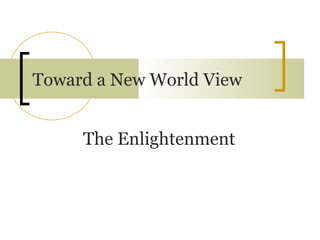
The Enlightenment
- 1. Toward a New World View The Enlightenment
- 2. The Enlightenment Intellectual movement of the late 17th and 18th centuries…a product of the Scientific Revolution.
- 3. The Enlightenment Key Principles of the Enlightenment: Belief that natural science and reason can explain all aspects of life The scientific method can explain the laws governing human society Progress—the creation of better societies and better people—is possible.
- 4. Bernard Fontanelle 1657-1757 Made the new science understandable to a large nonscientific audience. Stressed the idea of progress. Doubted the concept of absolute truth.
- 5. Pierre Bayle 1647-1706 Famous Skeptic. Argued that nothing can be known beyond all doubt. Stressed open- mindedness.
- 6. John Locke 1632-1704 An Essay Concerning Human Understanding (1690) Experience is the only source of knowledge. The human mind as birth is a Tabula rasa. Consequently, the knowledge of which we are capable is quite limited.
- 7. The Philosophes Committed to bringing the new thinking to an educated Public, not necessarily to the Masses.
- 8. Baron de Montesquieu 1689-1755 French social commentator and political theorist. Articulated the concept of the separation of powers in government.
- 9. Voltaire 1694-1778 French writer, essayist, deist and philosopher. Opposed injustice and unequal treatment before the law. Defender of civil liberties and social reform écrasez l'infâme!
- 10. Diderot and Alembert Edited the famed Encyclopédie beginning in the 1740’s. The self-professed aim of the Encyclopédie was to change the way people think.
- 11. Baron d'Holbach 1723-1789 Argued that humans are completely controlled by outside forces. He is most famous for being one of the first self-described atheists in Europe.
- 12. David Hume 1711-1776 Argued that the human mind was nothing but a bundle of impressions that originate in sense experiences. all ideas are representations of sensory experience.
- 13. Immanuel Kant 1724-1804 Believed that although all knowledge begins with experience, it does not follow that it all arises out of experience. The Critique of Pure Reason is an attempt to answer four questions: What can I know? What should I do? What may I hope for? What is a human being?
- 14. Jean-Jacques Rousseau 1712-1778 Attacked rationalism and civilization. Claimed that children must develop naturally. Argued that the General Will of the people is sacred and absolute.
- 15. Madame Geoffrin 1699-1777 French hostess who began to gather her “circle” in 1748. She gave two dinners per week: Monday for artists, and Wednesday, for the encyclopedists and philosophers.
- 17. Enlightened Absolutism Many philosophes believed that enlightened reforms could best be implemented by enlightened monarchs. Changes were best made from above rather than be forced from below.
- 18. Frederick the Great of Prussia Frederick used the War of the Austrian Succession to expand Prussia into a Great Power. Many reforms were enacted, but the conservative social order remained.
- 19. The War of the Austrian Succession 1740-1748 Begun by Frederick of Prussia by seizing Silesia from Austria. The War was ended by the Treaty of Aix- la-Chapelle in 1748
- 20. Seven Years War 1756-1763 The War represented a failed attempt by Austria to regain Silesia with Russia’s help. Described as the first world war, it enveloped both European and colonial theaters.
- 21. Catherine the Great of Russia Catherine imported western culture to Russia, supported the philosophes, and began a program of reform. Pugachev’s Revolt in 1773 led her to reverse the trend.
- 22. The Partitions of Poland
- 23. Maria Theresa of Austria Introduced reforms that limited church power, revised the tax system and bureaucracy, and reduced the burdens of serfdom. One of Europe’s most dynamic women of the 18th century.
- 24. Joseph II of Austria Maria Theresa’s son and successor. A dedicated reformer, he abolished serfdom, taxed all equally, and granted religious freedom. Joseph’s reforms were short-lived.
- 25. The Duke of Orleans Governed in a regency in the minority of Louis XV. The French nobility regained much of the power and influence lost during the reign of Louis XIV.
- 26. The Parlement of Paris Judicial functions evolving out of customary rights of consultation and deliberation. Traditionally “rubber- stamped” royal decrees. Won two decisive victories against taxation.
- 27. Louis XV of France Enjoyed a favorable reputation at the beginning of his reign in 1715. His inability to reform the French system, lack of morals and foreign policy setbacks lost him the support of his people.
- 28. Maupeou Abolished the Parlement de Paris. His attempts at financial reform in France signaled the demise of enlightened despotism.
- 29. Enlightened Absolutism By combining state- building with the culture of the Enlightenment, absolute monarchs succeeded in expanding the role of the state in the life of society.
Notas del editor
- Philosophers and philosophes the latter were a group of writers, like Voltaire, who tried to popularize the ideas of the Enlightenment as opposed to the scientists and thinkers that came up with theories and discoveries, like Descartes and Galileo. Public vs. “the people” audience for the philosophes was really a small educated group, there was no real wide-spread enlightenment yet. Thinkers often spoke in the name of “the people” nonetheless.
- Innate knowledge: examples: God, ideas of right and wrong, justice. These were thought to be somehow there in our minds to be discovered with the use of reason. Tabula rasa mind is born a “blank tablet” on which experience writes everything we come to know.